The latest government data revealed that regular pay in Japan grew at its fastest pace in over 28 years in May. This significant increase can be attributed to wage hikes that were negotiated during the spring labor talks.
The base salary experienced a remarkable 1.8 percent rise compared to the previous year, marking the largest increase since February 1995. This wage growth trend is closely monitored by the Bank of Japan (BOJ), which is considering the timing for unwinding its ultra-loose monetary stimulus.
BOJ Governor Kazuo Ueda has emphasized the importance of maintaining accommodative monetary policies until wages rise sufficiently to sustain a 2 percent inflation target. In line with this, the country’s largest trade union group, Rengo, reported that its member unions received the largest pay increase in three decades, with an average hike of 3.58 percent during this year’s salary negotiations.
The results of these labor talks will have an impact on wages moving forward, with adjustments expected to take effect by the summer, according to the officials from the labor ministry.
In May, total cash earnings or nominal wages increased by 2.5 percent year-on-year. This followed a revised 0.8 percent growth in April. The consumer price index used by the ministry to calculate real wages registered a slower increase of 3.8 percent in May compared to a 4.1 percent jump in April. It’s worth noting that inflation-adjusted real wages, a measure of households’ purchasing power, declined by 1.2 percent in May from the previous year, marking the 14th consecutive month of decline.
Special payments experienced a significant upswing of 22.2 percent in May, following a revised 0.7 percent gain in April. However, it’s important to note that special payments tend to be volatile outside of the twice-a-year bonus seasons of November to January and June to August. Overtime pay, a gauge of business activity, saw a slight increase of 0.4 percent in May compared to a revised 0.7 percent drop in April.
With these developments in wages and salary negotiations, it is crucial for businesses and individuals to stay informed. Subscribe to INQUIRER PLUS to access the latest news and information.
Denial of responsibility! SamacharCentrl is an automatic aggregator of Global media. In each content, the hyperlink to the primary source is specified. All trademarks belong to their rightful owners, and all materials to their authors. For any complaint, please reach us at – [email protected]. We will take necessary action within 24 hours.

Omprakash Tiwary is a business writer who delves into the intricacies of the corporate world. With a focus on finance and economic landscape. He offers readers valuable insights into market trends, entrepreneurship, and economic developments.


